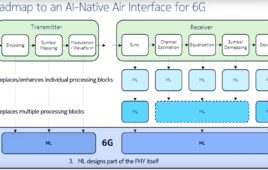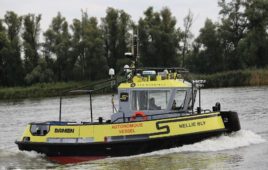Albatrosses are large flying birds that dynamically soar above the open sea. Unfortunately, many albatross species are vulnerable, threatened, and endangered, but British Antarctic Survey (BAS) Seabird Ecologist Richard Phillips plans to help these daring seabirds. Shared amongst likeminded projects, Phillips will receive part of a £3.75 million ($4.9 million) award to attach radar tags to albatrosses, which will track their interactions with fishing vessels in the South Atlantic.
The funding is part of the U.K. government’s Darwin Plus initiative, which supports projects focused on environmental protection in the U.K. Oversea Territories.
“Commercial fishing practices are considered the greatest threat to the survival of many albatross species,” according to the World Wide Fund (WWF). Specifically, a practice called “bycatch” is the main culprit, which the WWF describes as “the incidental capture of non-target species” by fishing gear, with each day bringing thousands of miles of new nets and lines to our oceans.
“Bycatch poses the biggest threat to almost all albatross species,” according to the WWF. “They dive for the fish bait used on longline fishing before it sinks into the sea, get entangled on the hook, and drown.”
To stop this trend, researchers will attach radar trackers to wandering albatrosses ranging from juvenile to adult on Bird Island, South Georgia. As the tags monitor their whereabouts, the team will have a better understanding of how often and where the birds come in contact with fishing vessels. This will help scientists correlate the bycatch risk with the age, breeding status, and sex of the albatrosses.
“We’ve known seabirds such as albatrosses and petrels are vulnerable to bycatch, particularly since the mid-1990s. What is exciting about this project is the use of new technology, radar-detecting tags, and 3D acceleration loggers. These technologies will allow us to gain a greater insight into how birds behave when foraging at sea behind fishing vessels and provide the first indication of the level of illegal fishing in the region. This collaborative project with BirdLife International will gather much-needed information to help inform policies to protect seabirds,” says Phillips.
Armed with this newfound, radar-tag data, policymakers can make more informed decisions about regulations and fishing practices, and monitor the compliance with bycatch mitigation.
Professor Stephen Blackmore, chair of the Darwin Plus Advisory Group, drives home the importance of novel projects that strive to safeguard biodiversity, “The range of the projects funded by Darwin Plus in our British Overseas Territories shows how we can effect change and better support and protect biodiversity around the globe. I am proud that we are delivering Darwin Plus funding to benefit animal and plant species and their habitats, which are vital to humanity’s economic and social development.”



